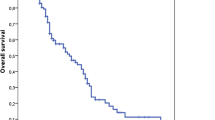Abstract
Purpose of this study was to determine the effect of waiting time for radiotherapy on overall survival of patients with glioblastoma treated in the EORTC-NCIC trial at 18 centers in France. A total of 400 adult patients with glioblastoma who were treated between January 1, 2006 and December 31, 2006 were included. There were 282 patients with “minimum criteria” according to the EORTC-NCIC trial: (i) concurrent chemotherapy with temozolomide; and (ii) age between 18 and 70 years old. Among these patients, 229 were treated with adjuvant temozolomide and were classified as “maximal criteria”. One-hundred and eighteen patients were in the “without minimal criteria” group. Waiting time from the first symptom (FS-RT), pathology diagnosis (P-RT), multidisciplinary meeting (MM-RT), surgery (S-RT), and CT scan for delineation (CT-RT) until the start of radiotherapy were recorded. Median follow-up for all patients was 327 days. Overall, median FS-RT, P-RT, MM-RT, CT-RT, and S-RT times were 77, 36, 32, 12, and 41 days, respectively. Median, and 12 and 24-month overall survival were 409 days, and 56.3 ± 2.1 % and 27.6 ± 2.6 %, respectively. Univariate analysis failed to reveal a difference in survival, irrespective of the delay. In multivariate analysis, independent favorable prognostic factors for overall survival were age (p ≤ 0.0001) and type of surgery (p = 0.0006). In this large series treated during the EORTC-NCIC protocol period, waiting time until radiotherapy did not seem to affect patient outcome.



Similar content being viewed by others
References
Mackillop WJ (2007) Killing time: the consequences of delays in radiotherapy. Radiother Oncol 84:1–4
Barton MB, Morgan G, Smee R, Tiver KW, Hamilton C, Gebski V (1997) Does waiting time affect the outcome of larynx cancer treated by radiotherapy? Radiother Oncol 44:137–141
Brouha XD, Op De Coul B, Terhaard CH, Hordijk GJ (2000) Does waiting time for radiotherapy affect local control of T1N0M0 glottic laryngeal carcinoma? Clin Otolaryngol Allied Sci 25:215–218
Buchholz TA, Austin-Seymour MM, Moe RE et al (1993) Effect of delay in radiation in the combined modality treatment of breast cancer. Int J Radiat Oncol Biol Phys 26:23–35
Hartsell WF, Recine DC, Griem KL, Murthy AK (1995) Delaying the initiation of intact breast irradiation for patients with lymph node positive breast cancer increases the risk of local recurrence. Cancer 76:2497–2503
Lee AW, Chan DK, Fowler JF et al (1994) T1 nasopharyngeal carcinoma: the effect of waiting time on tumor control. Int J Radiat Oncol Biol Phys 30:1111–1117
Recht A, Come SE, Henderson IC et al (1996) The sequencing of chemotherapy and radiation therapy after conservative surgery for early-stage breast cancer. N Engl J Med 334:1356–1361
Choi N, Baumann M, Flentjie M et al (2001) Predictive factors in radiotherapy for non-small cell lung cancer: present status. Lung Cancer 31:43–56
Tsai CS, Lai CH, Wang CC et al (1999) The prognostic factors for patients with early cervical cancer treated by radical hysterectomy and postoperative radiotherapy. Gynecol Oncol 75:328–333
Do V, Gebski V, Barton MB (2000) The effect of waiting for radiotherapy for grade III/IV gliomas. Radiother Oncol 57:131–136
Irwin C, Hunn M, Purdie G, Hamilton D (2007) Delay in radiotherapy shortens survival in patients with high grade glioma. J Neurooncol 85:339–343
Lopez, S, Calugaru, V, Lamproglou, I, et al. (2008) Les effets de la liste d’attente sur la survie des patients atteints de glioblastome traité par irradiation. Cancer/Radiothér 12(8):827–830
Noel G, Quetin P, Heymann S, Karamanoukian D, Schott R (2009) Waiting times do not negatively modify outcome of patients with multiform glioblastoma. Cancer Radiother 13:17–23
Lai R, Hershman DL, Doan T, Neugut AI (2010) The timing of cranial radiation in elderly patients with newly diagnosed glioblastoma multiforme. Neurooncology 12:190–198
Blumenthal DT, Won M, Mehta MP et al (2009) Short delay in initiation of radiotherapy may not affect outcome of patients with glioblastoma: a secondary analysis from the radiation therapy oncology group database. J Clin Oncol 27:733–739
Stupp R, Mason WP, van den Bent MJ et al (2005) Radiotherapy plus concomitant and adjuvant temozolomide for glioblastoma. N Engl J Med 352:987–996
Lawrence YR, Blumenthal DT, Matceyevsky D, Kanner AA, Bokstein F, Corn BW (2011) Delayed initiation of radiotherapy for glioblastoma: How important is it to push to the front (or the back) of the line? J Neurooncol 105:1–7
Stupp R, Hegi ME, Mason WP et al (2009) Effects of radiotherapy with concomitant and adjuvant temozolomide versus radiotherapy alone on survival in glioblastoma in a randomised phase III study: 5-year analysis of the EORTC-NCIC trial. Lancet Oncol 10:459–466
Burnet NG, Jena R, Jefferies SJ, Stenning SP, Kirkby NF (2006) Mathematical modelling of survival of glioblastoma patients suggests a role for radiotherapy dose escalation and predicts poorer outcome after delay to start treatment. Clin Oncol (R Coll Radiol) 18:93–103
Taghian A, Ramsay J, Allalunis-Turner J et al (1993) Intrinsic radiation sensitivity may not be the major determinant of the poor clinical outcome of glioblastoma multiforme. Int J Radiat Oncol Biol Phys 25:243–249
Mackillop WJ, Bates JH, O’Sullivan B, Withers HR (1996) The effect of delay in treatment on local control by radiotherapy. Int J Radiat Oncol Biol Phys 34:243–250
Luchi T, Hatano K, Kodama, T, et al. (2010) Brain deformation after surgery of glioblastoma should we take MRI for planning of irradiation? Radiother Oncol 96:S256 (abst. 708)
Peker S, Abacioglu U, Sun I, Yuksel M, Pamir MN (2004) Irradiation after surgically induced brain injury in the rat: timing in relation to severity of radiation damage. J Neurooncol 70:17–21
Conflicts of Interest
All authors declared no conflicts of interest.
Author information
Authors and Affiliations
Corresponding author
Rights and permissions
About this article
Cite this article
Noel, G., Huchet, A., Feuvret, L. et al. Waiting times before initiation of radiotherapy might not affect outcomes for patients with glioblastoma: a French retrospective analysis of patients treated in the era of concomitant temozolomide and radiotherapy. J Neurooncol 109, 167–175 (2012). https://doi.org/10.1007/s11060-012-0883-7
Received:
Accepted:
Published:
Issue Date:
DOI: https://doi.org/10.1007/s11060-012-0883-7




